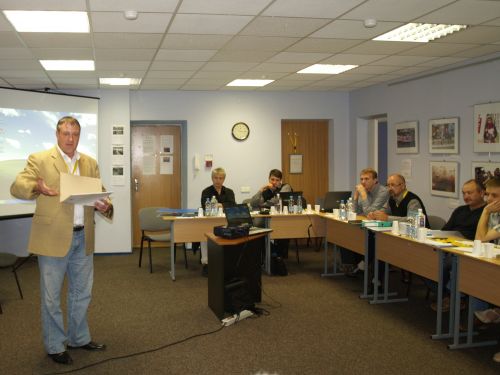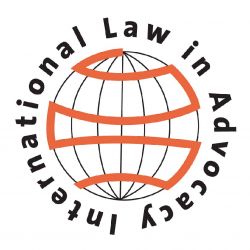 The 18-20 September meeting of Belarusian human rights defenders, graduates of the Bring International Standards Home program, in Vilnius Human Rights House predominantly centred on their practical activities after the program completion.
The 18-20 September meeting of Belarusian human rights defenders, graduates of the Bring International Standards Home program, in Vilnius Human Rights House predominantly centred on their practical activities after the program completion.
An honest and open discussion showed that lots have been done and even more will have to be accomplished.
As a result of this meeting we realised that there existed at least two approaches on how to embed international human rights standards into the Belarusian legal practice. The first approach concentrates on a hands-on work with courts, law enforcement agencies and lawyer associations. One of the most popular instruments, which has a direct practical sense, is writing complaints, representing interests in courts, further ‘knocking on the official doors’ in search of the truth included referring to the UN Committee on human rights. It is not a secret to anyone that the mass human rights negligence in Belarus is only possible because of the absolute ignorance of the overwhelming majority of Belarusian lawyers when it comes to the human rights meaning in legal terms and as well as their knowledge gap about international responsibilities and treaties signed by Belarus. Practical references in legal documents to international treaties, agreements and laws make judges, prosecutors, police and lawyers at least look for these pieces of legislation and get familiar with them.
The first approach could ironically be called ‘beating around the bush.’ Please do not be alarmed and confused for the author of this text is very fond of this particular way of dealing with the human rights. Its essence lies in the fact that the human rights are not only very concrete legal documents and acts but it is also a vast theoretical base that had been compiled throughout the entire human history. It includes philosophical papers as well as history of establishing and naming certain terms and values. In a nut shell it is all the intellectual work that has proven necessity and infallibility of individual’s human rights and freedoms. And when this sort of information is directed at a person whose level of education and general development is a little more than zero, then the magnitude of impact is much greater than from a dry recitation of legal terms and definitions.
Internet-resources and publications in mass media, magazines and news papers, motion pictures and otherwise any informational work make up great means to deliver important human rights values to an ordinary citizen, bringing human rights philosophy (or ideology) a lot closer and in a more personal way for anybody to accept. This relentless and serious work would eventually lead to an increased level of respect towards human rights in Belarus. Through ordinary citizens it could trickle up and influence legal practices of the state.
In a political campaigning there is a principle borrowed from advertisers, the principle of totality. I could briefly sum it up: your message will be delivered to your potential audience most effectively only if it is transmitted using all channels possible in your particular conditions. Let’s say that your opponent only uses TV for announcements whereas you employ TV and newspaper ads, street leaflets, mass mail, door-to-door information. Your chances of winning will be much higher even if given equal budgets you spend a lot less on one of your channels of communication than your opponent spends on his sole means of communication, TV.
In my opinion, uniqueness of the first Bring International Standards Home graduates lies in the fact that our group very naturally found a balance between our interests and practical approaches in our work. As a result today we can almost certainly claim that slowly but surely we are nearing this very same principle of totality.
The program alumnus Leanid Sudalenka excelled in writing complaints and working in courts. He submitted the most individual complaints to the UN Committee on Human Rights than any other human rights defender in Belarus; and to do so he had to go through all appeal stages of the national legal system.

Leanid Svetsik achieved first but very concrete successes in a struggle with the state system.
The program has its own Internet-resource prava-by.info, which contains the most complete compilation of human rights materials up to date in Belarus. Human rights defender form Žodzina (sity in Central Belarus) Ales Lapitski has developed this project.
Karnei Piatrovich, activist from Baranavičy (city in South-West Belarus) declared the work on publishing a periodical human rights magazine was nearly finished.
And the first Belarusian Interactive Human Rights Encyclopaedia (IHRE) on DVD, prepared by your author, would hopefully find its place amongst commendable initiatives of my colleagues. IHRE includes factual legal documents and materials as well as lectures, documentaries and literature on human rights.
Thus, it is evident that all possible channels available to public activists and program graduates today in Belarus to spread respectable treatment and understanding the human rights in its larger context are being used! And that would be the most important outcome of more than two year work: the principle of totality in action!
Of course, I had to point out shortcomings that we unearthed while jointly analysing the program outcomes. Human rights defenders writing complaints and those who regularly win their cases (when UNCHR takes their side and recommends to the Belarusian government to remedy a situation) are yet to find mechanisms on how to force the state implement these recommendations.
The Internet resource, as it appears, still needs further technical improvements and promotion for the larger audience. And Human Rights Encyclopaedia requires more informational additions.
However, shortcomings and difficulties, as serious as they might be, should not frustrate the projects initiators. The first step is always the most difficult one, and making improvements is always satisfying and rewarding.





